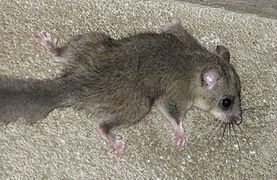Edible dormouse
| Edible dormouse Temporal range: Oligocene–Recent
| |
|---|---|

| |
| Scientific classification | |
| Kingdom: | |
| Class: | |
| Order: | |
| Family: | |
| Subfamily: | |
| Genus: | Glis
|
| Binomial name | |
| Glis glis (Linnaeus, 1766)
| |

The edible dormouse or fat dormouse (Glis glis) is a small dormouse and the only species in the genus Glis.
Fat dormice are the largest dormice in Europe. The ancient Romans used to breed them to be eaten (usually as a snack). This is the reason for the word edible in its name. The dormice were kept in large pits or in terra cotta containers (which were called gliraria),[1] which were like modern hamster cages.
Wild edible dormice are still eaten in Slovenia, and trapping dormice is a Slovenian tradition. Using dormice for food and fur is mentioned in documents which were written in the 13th century. They also mention the use of dormouse fat as a medicine. Poor and hungry peasants would eat dormice during winter because it is a good protein source.[2]
The edible dormouse lives in Europe. It was accidentally introduced to the town of Tring in England after some dormice escaped from the private collection of Lionel Walter Rothschild in 1902.[3] The British edible dormouse population is about 10,000[4] and is found in a 200-square-mile (520 km2) triangle between Beaconsfield, Aylesbury and Luton.[5] This animal is seen as a pest by some people.[3] In the United Kingdom the Wildlife and Countryside Act 1981 does not allow some ways of killing them, and to remove the dormice from the area may require a license.[4]
References
[change | change source]- ↑ E. Saglio, "Glirarium". In Daremberg and Saglio, Dictionnaire des Antiquités Grecques et Romaines, Tome II (Volume 2), page 1613, Librairie Hachette et Cie., Paris, 1877–1919.
- ↑ Haberl, Werner. Dormouse hunting in Slovenian tradition Dormouse culture, tradition & myths. 2007. 3 October 2007
- ↑ 3.0 3.1 "Invasion of the glis glis". Daily Mail. 2006-10-23. Retrieved 2008-03-29.
- ↑ 4.0 4.1 "Edible Dormice (Glis glis)". Natural England. 2008-11-11. Retrieved 2009-05-02.
- ↑ The Glis glis around Amersham Archived 2006-08-23 at the Wayback Machine. Amersham - News, Views and Information. 3 October 2007
- Amori, G.; et al. (2008). "Glis glis". IUCN Red List of Threatened Species. Version 2008. International Union for Conservation of Nature. Retrieved 13 Oct 2008.
Other websites
[change | change source]- The Dormouse Hollow
- Rodent page from Mammals Trust UK (includes sound file of Glis glis cry) Archived 2008-01-30 at the Wayback Machine
- Amersham.org page on Glis glis Archived 2006-08-23 at the Wayback Machine

